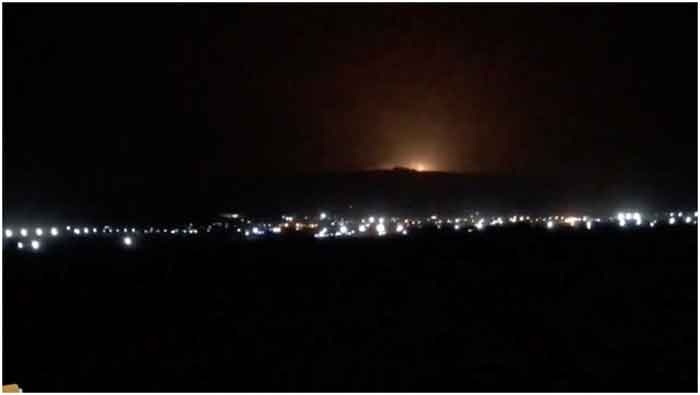
Jets from Turkey carried out cross-border airstrikes on Monday targeting the Kurdistan Workers Party (PKK), the Turkish Kurdish rebels in northern Iraq, announced Turkish authorities.
A source in the area told Kurdistan 24 the Turkish fighter jets launched the attack at midnight, targeting several locations in the Shingal (Sinjar) district, and several locations close to the Makhmour refugee camp, which has been hosting Kurdish refugees from Turkey.
The Turkish Defense Ministry tweeted: The latest “Operation Claw-Eagle” hit suspected targets of the outlawed PKK in several regions in Iraq’s north, including Sinjar (Shingal).
The Turkish military claimed 81 PKK targets were struck including shelters and caves, saying that the jets took maximum care not to harm civilians.
There was no immediate statement from the PKK, which has waged a more than three-decade-old insurgency in southeastern Turkey.
Ankara frequently conducts aerial attacks against the PKK, which maintains bases in northern Iraq.
Iraqi Joint Operations Command condemns Turkish bombing
From Erbil, the Kurdistan 24 reported:
On Monday, the joint operations command in Iraq condemned the Turkish bombing that targeted the alleged PKK locations in Shingal and Makhmour, demanding Ankara to stop the bombing “out of respect” for the common interests between the two countries.
“We condemn the infiltration of Iraqi airspace by Turkish planes,” a statement from Iraq’s joint operations command read.
It noted that 18 Turkish planes “headed toward Shingal, Makhmour, Gwer, and Erbil, reaching up to the district of Sharqat inside Iraqi airspace at a depth of 193 kilometers far from the Turkish borders.”
“The Turkish planes approached the Iraqi borders several times last night, and this provocative behavior does not comply with the obligations of the good neighbor in accordance with international agreements and is a flagrant violation of Iraqi sovereignty.”
The Iraqi Joint Operations Command urged Turkey to “stop these violations out of respect and commitment to the common interests between the two countries, calling on them not to repeat it.”
The statement also mentioned “Iraq is prepared to cooperate between the two countries and to control the security situation on the border areas,” without providing further details.
Turkish shelling in the border areas and the Qandil Mountains has become a norm since the peace process between the PKK and Ankara collapsed in 2015. Monday’s latest Turkish aerial assault targeted areas that Ankara claims have become a PKK “den.”
The PKK, headquartered in the Kurdistan Region’s Qandil Mountains, has been fighting an almost four-decade-long insurgency against Ankara, which has resulted in over 40,000 casualties on both sides.
Turkish airstrike on Iraq hindering Yezidi’s return, say aid organizations
Yezidi activists and aid organizations have come out in criticism of Turkey’s airstrike, saying it posed a threat to the minority making its way to the region after being displaced, Kurdistan24 news site reported on Monday.
Turkish airstrikes in the Sinjar district could hamper the return of scores of Yezidi families to their homes, leading members of the minority community said.
The attack arrived a day after the Iraqi Ministry of Migration and Displacement had announced the return to Sinjar of over 200 Yezidis from camps in the northern Duhok province.
“Over 150 Yezidi families had just returned to their homes,’’ Yezidi activist and Nobel laureate Nadia Murad wrote on Twitter on Sunday. “When will the Iraqi government and the international community apply some courage and political will to resolving security challenges in Sinjar?”
Pari Ibrahim, founder and executive director of the Free Yezidi Foundation (FYF), told Kurdistan 24 that Turkey’s “outrageous and unjustifiable” attacks in Shingal destabilize the region.
“This is a violation of international law, a destabilizing action, and an unnecessary and cruel attack that has severe consequences on the Yezidi community seeking to recover from a genocide and rebuild,” she said.
The timing of Turkey’s airstrikes demonstrates that Ankara is pursuing a more elaborate plan rather than just targeting the PKK, Hayrî Demir, editor-in-chief of EzidiPress, told Kurdistan 24.
The vice chair of the U.S. Commission on International Religious Freedom Nadine Maenza told Kurdistan 24 that Turkey’s attack would “deter others from returning.”
The ancient Yezidi religious minority that lives in the region faced genocide at the hands of the Islamic State, which captured their homeland in 2014. They regained their homes when the jihadists were driven out by Iraqi and Kurdish forces in 2017.
Turkish police fire tear gas
In a separate development, Turkish police fired tear gas and plastic bullets on Monday at pro-Kurdish demonstrators supporting opposition lawmakers who had been removed from parliament, AFP said.
Dozens of people reportedly rallied in Silivri, northwest Turkey, after the parliament barred a deputy from the Republican People’s Party (CHP), along with two from the pro-Kurdish Peoples’ Democratic Party (HDP), from serving in the assembly.
 Eurasia Press & News
Eurasia Press & News



